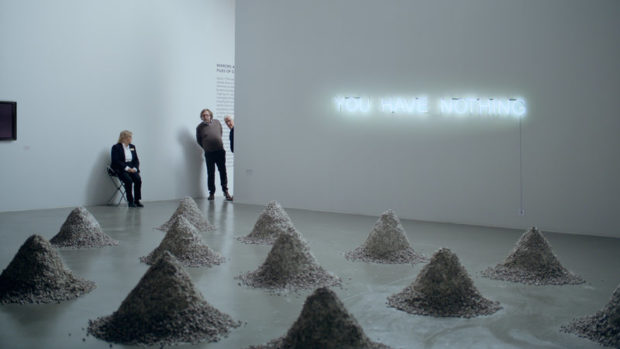
 Ruben Őstlund’s latest film savagely satirizes establishment complacency and self-regard, using the theme of modern art to reflect on the porous boundaries between civilization and barbarism.
Ruben Őstlund’s latest film savagely satirizes establishment complacency and self-regard, using the theme of modern art to reflect on the porous boundaries between civilization and barbarism.
The surprise winner at the Cannes Film Festival this year was The Square, a provocative and disturbing satire from Swedish writer-director Ruben Őstlund. Őstlund made a splash a few years ago with an excellent little film called Force Majeure, about a man whose split-second cowardice when his family is apparently threatened by an avalanche at a Swiss ski resort creates ever-increasing problems. That was a dark comedy of discomfort, but The Square widens that scope considerably, taking aim at the hypocrisy of the entire political and social order, and eliciting both laughs and gasps from the film’s audience.
Claes Bang plays Christian, the suave curator and public relations director of Stockholm’s modern art museum. Tall, dark, and handsome, with a slick public speaking delivery, Christian is excellent at keeping the museum on the cutting edge of art world prestige, as well as keeping its wealthy donors satisfied. At one speech announcing the museum’s latest high-profile installation, he stops reading his prepared written remarks, and talks off-the-cuff instead, successfully charming his audience. But in a previous scene we’ve witnessed him rehearsing that very ploy in private.
That latest art installation gives the film its title. “The Square” is a four by four meter quadrant set into the plaza in front of the museum. The idea is that those standing within that small space are obligated to say yes to any person asking for help, in other words to provide help to the best of his or her ability. There’s a lot of high-handed liberal rhetoric attached to the piece, which is funny because it’s essentially an empty space. A couple of spiky young social media experts hired by the museum to promote the piece say it’s too bland to attract much attention. Their idea of how to change that ends up causing a lot of trouble.
On the plaza, in which quite a few quite a few homeless beggars are routinely ignored by passers-by, Christian falls victim to a scam in which he defends a woman apparently fleeing an attacker, and has his pocket picked as a reward. He is able to track his stolen cell phone to an apartment building on the rough side of town, and then, on the suggestion of one of his young assistants, makes a spectacularly bad decision. He writes a letter saying he knows who did it, and demanding his phone and wallet be returned or else, and drops copies of this letter in every mail slot of every apartment in the building. This, of course, leads to unwanted consequences.
Bang seems to me a perfect choice for the lead role of Christian. In the course of the film, Christian’s every shortcoming and habitual flaunting of male privilege is exposed, or comes under threat, and at the same time, Bang, a popular television star in Sweden, lends humor, pathos, and sympathy to the character. The reliable Elisabeth Moss is on hand as an American journalist who introduces Christian to yet more trouble.
As the museum and its curator get roughed up with embarrassment and scandal, we find that Ostlund’s target is not really the easy one of pretensions in the art world, but of the complacency of mainstream society in general, which gives lip service to liberal ideals while maintaining the status quo at all costs. A major set-piece in which a fashionable fundraising dinner is turned into a frightening ordeal by the antics of a performance artist pretending to be a savage ape-like predator, encapsulates The Square’s theme—the close proximity of prosperous first world civilization and outright barbarism. But Ostlund’s even-handed focus on the frailty and inward confusion of human beings keeps the comedy from becoming too bitter. The Square is a challenging and invigorating provocation.

